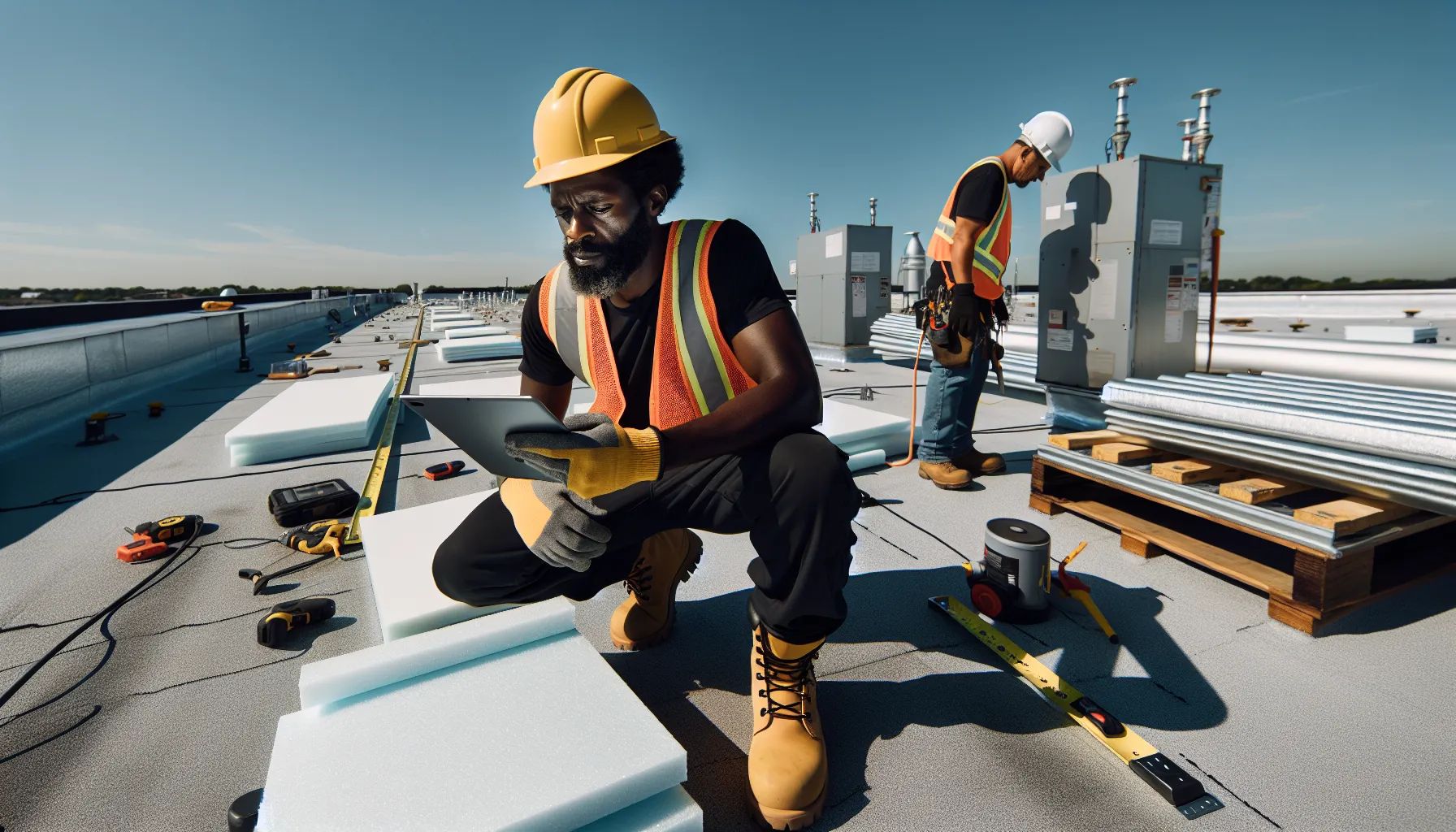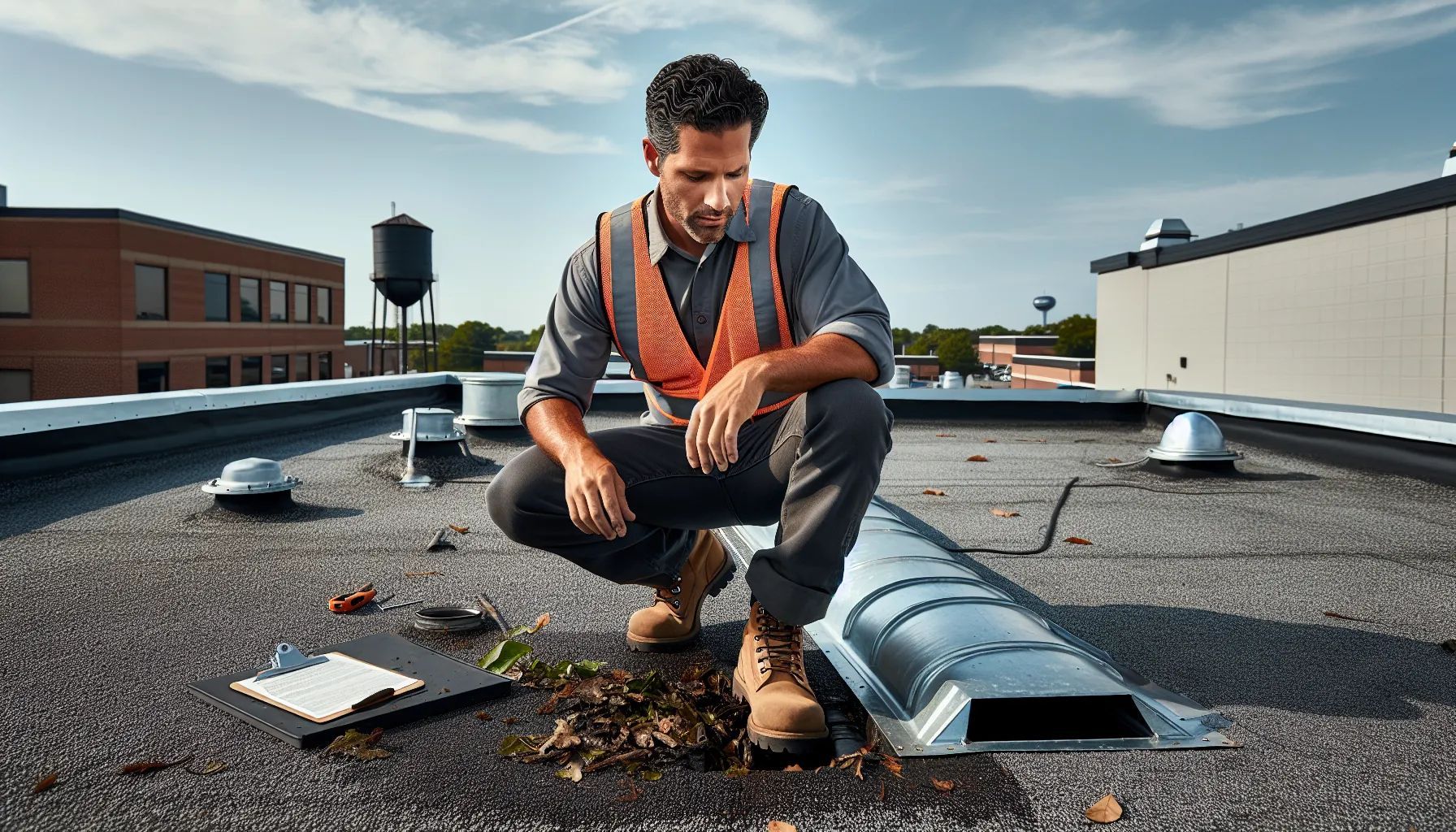How to Choose a Commercial Roofing Contractor: Essential Tips for Smart Business Decisions

Finding the right commercial roofing contractor can make or break your building's protection and your company's bottom line. With countless contractors claiming to be the best, it's challenging to separate skilled professionals from those who'll leave you with costly problems down the road.
We've seen too many businesses suffer from poor workmanship, unexpected costs and project delays simply because they didn't know what to look for in a contractor. The difference between a successful roofing project and a disaster often comes down to the selection process itself.
Whether you're planning routine maintenance or a complete roof replacement, knowing the right questions to ask and red flags to avoid will save you time, money and headaches. We'll walk you through the essential factors that separate exceptional contractors from the rest.
Understanding Your Commercial Roofing Needs
Before we select a commercial roofing contractor, we must evaluate our specific requirements. This assessment helps us communicate effectively with potential contractors and ensures we receive accurate project estimates.
Assessing Your Roof's Current Condition
We start by examining our roof's age and visible damage indicators. Commercial roofs typically last 20-30 years depending on the material type. We inspect for water stains on interior ceilings, pooling water on flat surfaces, and damaged flashing around equipment penetrations.
Professional roof inspections cost $200-$500 and provide detailed condition reports. These reports identify:
- Membrane tears or punctures
- Loose or missing fasteners
- Deteriorated sealants
- Drainage problems
- Insulation moisture levels
We document all findings with photographs and measurements. This documentation becomes our baseline for contractor discussions. We note emergency repair areas that require immediate attention versus preventive maintenance items.
Regular inspections twice yearly prevent minor issues from becoming major expenses. Spring inspections catch winter damage while fall inspections prepare roofs for harsh weather. We maintain inspection records to track deterioration patterns over time.
Determining Project Scope and Timeline
We define our project parameters by categorizing work into three types: repairs, restoration, or complete replacement. Repairs address isolated problems like 10-20 square feet of damaged membrane. Restoration involves coating applications or partial replacements covering 25-50% of the roof surface. Complete replacement becomes necessary when repairs exceed 40% of the total roof area.
Our timeline considerations include:
| Factor | Time Impact |
|---|---|
| Weather conditions | Add 2-4 weeks for winter projects |
| Material availability | Standard materials: 1-2 weeks; Custom orders: 4-8 weeksl |
| Building operations | After-hours work doubles project duration |
| Permit processing | Municipal permits: 2-3 weeks |
We coordinate roofing work with our business operations to minimize disruptions. Manufacturing facilities schedule projects during planned shutdowns. Retail locations prefer overnight or weekend work. We factor these scheduling constraints into our contractor selection process.
Setting a Realistic Budget
Commercial roofing costs range from $3.50-$28.00 per square foot depending on material selection and project complexity. We calculate our budget using these baseline figures:
| Roofing Type | Cost per Square Foot | 10,000 sq ft Example |
|---|---|---|
| Built-up Roof (BUR) | $3.50-$7.00 | $35,000-$70,000 |
| Modified Bitumen | $4.00-$8.00 | $40,000-$80,000 |
| EPDM Rubber | $3.50-$7.50 | $35,000-$75,000 |
| TPO | $3.50-$8.50 | $35,000-$85,000 |
| PVC | $4.50-$10.00 | $45,000-$100,000 |
| Metal | $7.00-$14.00 | $70,000-$140,000 |
We allocate 10-15% contingency funds for unexpected discoveries during tear-off. Additional budget items include disposal fees ($300-$500 per ton), permit costs ($500-$2,000), and temporary weather protection ($0.50-$1.00 per square foot).
We explore financing options through roofing contractors who offer payment plans. Energy-efficient roofing materials qualify for tax credits that offset 10-30% of project costs. We factor these incentives into our total investment calculations.
Essential Credentials to Look For

We recommend verifying specific credentials when evaluating commercial roofing contractors to ensure professional standards and protect your investment. These qualifications demonstrate a contractor's commitment to quality workmanship and business integrity.
Licensing and Insurance Requirements
Contractors must hold valid roofing licenses issued by state or local authorities. These licenses confirm contractors have passed required examinations and comply with building codes and regulations. We verify license status through state licensing boards before considering any contractor for our projects.
Insurance coverage protects both parties during roofing projects. General liability insurance covers property damage that might occur during work. Workers' compensation insurance protects you from liability if workers suffer injuries on your property. We request certificates of insurance directly from insurance providers to confirm active coverage.
Commercial roofing contractors typically carry minimum liability coverage of $1 million per occurrence. Workers' compensation requirements vary by state but generally cover medical expenses and lost wages for injured workers. We document insurance expiration dates and ensure coverage remains active throughout project duration.
Contractors operating without proper licensing face fines ranging from $500 to $5,000 depending on jurisdiction. Unlicensed contractors cannot legally enforce contracts in most states. We protect our interests by working exclusively with fully licensed and insured professionals.
Industry Certifications and Manufacturer Partnerships
Professional certifications demonstrate advanced training and expertise in commercial roofing systems. The National Roofing Contractors Association (NRCA) offers certification programs covering installation techniques and safety protocols. Contractors with NRCA certifications complete ongoing education to maintain their credentials.
Manufacturer partnerships provide additional quality assurance for commercial roofing projects. Certified contractors receive specialized training on specific roofing systems from manufacturers like GAF, Firestone, and Carlisle. These partnerships often include enhanced warranty options backed by manufacturers.
We prioritize contractors certified in multiple roofing systems including TPO, EPDM, and modified bitumen. Certifications from Underwriters Laboratories (UL), FM Approvals, and Miami-Dade County indicate products meet rigorous testing standards. These approvals matter particularly in regions with extreme weather conditions.
Manufacturer-certified contractors typically offer warranties extending 10-20 years on materials and 2-5 years on workmanship. Standard installations without manufacturer partnerships usually include only 1-year workmanship warranties. We document all certification numbers and warranty terms before signing contracts.
Evaluating Experience and Expertise

Experience and expertise form the foundation of reliable commercial roofing services. We examine three critical areas that separate qualified contractors from inexperienced ones.
Years in Business and Local Presence
Commercial roofing contractors with 10+ years of operation demonstrate stability and reliability. We look for contractors who've weathered economic downturns and maintained consistent service quality. Local presence matters because contractors familiar with regional weather patterns understand specific challenges like hurricane resistance in coastal areas or snow load requirements in northern climates.
Established contractors maintain physical offices and warehouses within 50 miles of your project site. This proximity ensures faster response times for emergencies and easier warranty claim processing. Local contractors also understand municipal building codes and permit requirements, reducing project delays.
We verify business longevity through state registration records and contractor associations. Contractors operating under the same business name for extended periods indicate financial stability. Those who frequently change names or relocate may hide poor performance histories.
Long-term local contractors build relationships with suppliers, securing better material pricing and availability. These relationships translate to cost savings and shorter project timelines for your commercial roof installation.
New Title
A strong commercial portfolio showcases completed projects similar to your building type and size. We examine portfolios containing office buildings, warehouses, retail centers, and industrial facilities completed within the past 5 years. Quality contractors display 20-30 projects with detailed specifications including square footage, roofing system type, and project duration.
Portfolio reviews reveal expertise in specific commercial sectors. Contractors specializing in healthcare facilities understand clean room requirements and minimal disruption protocols. Those focusing on manufacturing plants know how to work around production schedules and equipment protection needs.
We request contact information for 5-10 recent commercial clients. Speaking with property managers and facility directors provides insights into contractor performance, communication, and problem-solving abilities. References from projects completed 2-3 years ago reveal how well installations hold up over time.
High-quality portfolios include before-and-after photos, thermal imaging results, and warranty documentation. Contractors who document their work thoroughly demonstrate professionalism and attention to detail. This documentation proves valuable for your own facility management records.
Specialized Roofing System Knowledge
Commercial roofing encompasses multiple system types, each requiring specific installation techniques. We prioritize contractors certified in TPO, EPDM, PVC, modified bitumen, and metal roofing systems. Certification from manufacturers like GAF, Carlisle, or Firestone indicates proper training and adherence to installation specifications.
Specialized knowledge extends beyond installation to system selection. Experienced contractors analyze your building's structural capacity, energy efficiency goals, and budget constraints to recommend appropriate solutions. They explain pros and cons of each system, including lifespan expectations ranging from 15 years for modified bitumen to 50+ years for properly maintained metal roofs.
Green roofing and solar-ready installations require additional expertise. Contractors versed in vegetative roof systems understand drainage requirements, structural load calculations, and plant selection for your climate zone. Those offering solar-compatible roofing coordinate with solar installers to ensure proper mounting and waterproofing.
We evaluate contractors' continuing education commitments. Industry leaders attend annual training sessions, participate in manufacturer updates, and maintain multiple system certifications. This ongoing education ensures familiarity with latest materials, techniques, and energy efficiency standards that benefit your commercial property.
Researching Contractor Reputation

We recognize that a commercial roofing contractor's reputation directly reflects their ability to deliver quality work. Our evaluation process starts with comprehensive research into the contractor's track record and customer satisfaction levels.
Comparing Bids and Proposals
Comparing multiple bids helps us make informed decisions about commercial roofing contractors. We recommend requesting detailed proposals from at least three contractors to ensure comprehensive evaluation of costs, services, and project approaches.
Understanding Detailed Cost Breakdowns
A transparent cost breakdown reveals exactly where our investment goes in a commercial roofing project. We look for proposals that separate costs into distinct categories: materials, labor, permits, disposal fees, and equipment rental. Materials typically account for 40-60% of total project costs, while labor represents 25-35%.
Quality contractors itemize specific roofing materials with manufacturer names and model numbers. For example, they list "Carlisle SynTec 60-mil EPDM membrane" rather than generic "rubber roofing." Labor costs break down into hourly rates multiplied by estimated work hours, showing crew size and project duration.
Permit fees vary by location and project scope, ranging from $500 to $5,000 for commercial projects. Disposal costs depend on existing roof removal requirements, averaging $0.50 to $1.00 per square foot. Equipment rental for cranes or specialized tools adds 5-10% to project costs.
We verify manufacturer specifications match industry standards for commercial applications. Contractors include proof of manufacturer approval in their bids, confirming proper material selection and installation methods qualify for extended warranties.
Evaluating Warranty Terms and Coverage
Commercial roofing warranties protect our investment through two distinct types: workmanship warranties and material warranties. Workmanship warranties cover installation defects and typically last 2-10 years, depending on the contractor's confidence in their crew's skills. Material warranties from manufacturers extend 10-30 years, covering defects in the roofing products themselves.
We examine warranty coverage details for specific exclusions and requirements. Common exclusions include damage from extreme weather events, improper maintenance, or unauthorized modifications. Some warranties require annual inspections to remain valid, costing $500-$1,500 per inspection.
Contractors offering comprehensive warranties demonstrate confidence in their work quality. We prioritize contractors providing minimum 5-year workmanship warranties backed by their company's financial stability. Material warranties depend on proper installation according to manufacturer specifications, making certified installers essential.
Extended warranty options increase initial costs by 10-15% but provide long-term value. For example, upgrading from a 10-year to 20-year warranty on a 20,000-square-foot roof adds $10,000-$15,000 but saves potential replacement costs exceeding $100,000.
Key Questions to Ask Potential Contractors
We recommend asking specific questions to evaluate contractor capabilities and protect your investment. These questions reveal crucial information about their qualifications, work processes, and business practices.
Safety Protocols and OSHA Compliance
Contractors must demonstrate commitment to workplace safety through documented protocols and OSHA compliance. Ask for their safety program documentation and verify current OSHA certification status. Request their Experience Modification Rate (EMR), which indicates past safety performance - rates below 1.0 show better-than-average safety records.
We suggest asking about specific safety measures for your project type. Commercial roofing contractors carry out fall protection systems, conduct daily safety briefings, and maintain emergency response procedures. Verify they provide personal protective equipment (PPE) for all workers including hard hats, safety harnesses, and non-slip footwear.
Insurance verification protects your business from liability. Confirm the contractor carries general liability insurance with minimum $1 million coverage and workers' compensation for all employees. Request certificates of insurance directly from their insurance provider before work begins.
Safety violations result in project delays and potential legal issues. Ask about any OSHA citations in the past five years and how they addressed them. Professional contractors maintain clean safety records and invest in ongoing safety training for their crews.
Project Management and Communication Process
Effective project management determines roofing project success. Ask contractors to outline their project timeline with specific milestones for material delivery, tear-off, installation, and final inspection. Professional contractors provide detailed schedules accounting for weather delays and material availability.
Communication protocols prevent misunderstandings and keep projects on track. Request information about their communication methods - daily progress reports, weekly meetings, or digital project management platforms. Identify your primary point of contact and their availability during the project.
Quality control measures ensure proper installation. Ask about their inspection process at each project phase. Experienced contractors conduct moisture testing before installation, photograph progress daily, and perform final inspections with detailed checklists.
Weather contingency planning protects project timelines. Commercial roofing contractors monitor weather forecasts and adjust schedules accordingly. They explain backup dates for weather delays and how they protect exposed areas during unexpected storms. Material storage and staging plans prevent damage and theft while maintaining site organization.
Red Flags to Avoid
Recognizing warning signs helps protect your business from unreliable contractors who could compromise your roofing project. We've identified critical red flags that signal potential problems before signing any contracts.
Unusually Low Bids
Commercial roofing contractors offering prices 30-40% below market average often cut corners to maintain profit margins. These contractors typically use inferior materials like single-ply membranes under 45 mils thickness instead of industry-standard 60-mil products. Low bidders frequently lack adequate insurance coverage, exposing your business to liability claims if workers suffer injuries on your property.
Budget contractors sometimes employ inexperienced crews who lack proper safety training and roofing certifications. These teams make installation errors that void manufacturer warranties and create leaks within 2-3 years. Quality commercial roofing installations cost $3.50-$14.00 per square foot depending on materials and complexity.
We recommend obtaining at least three detailed proposals to establish realistic pricing expectations. Compare material specifications, warranty terms, and crew qualifications alongside pricing. Contractors offering extremely low bids often add hidden charges during projects, eventually costing more than reputable companies' initial quotes.
High-Pressure Sales Tactics
Professional contractors allow businesses adequate time to review proposals and make informed decisions. Aggressive salespeople who demand immediate signatures or deposits indicate questionable business practices. These contractors often claim special pricing expires within 24-48 hours or manufacture urgency through false scarcity tactics.
Reputable commercial roofing companies understand businesses require approval from multiple stakeholders before committing to major capital expenditures. Quality contractors provide detailed proposals valid for 30-60 days, allowing proper evaluation and budget planning. They answer questions thoroughly without rushing decisions or creating artificial deadlines.
Watch for contractors who discourage obtaining competitive bids or speaking with previous clients. Legitimate businesses welcome comparison shopping because their work quality and fair pricing speak for themselves. High-pressure contractors often disappear after receiving deposits, leaving businesses with incomplete work and financial losses.
Lack of Written Documentation
Every commercial roofing project requires comprehensive written contracts detailing specific work scope, materials, timelines, and payment schedules. Verbal agreements leave businesses vulnerable to disputes over project specifications and costs. Professional contractors provide itemized proposals including material brands, thicknesses, installation methods, and warranty coverage.
Written documentation protects both parties by establishing clear expectations and responsibilities. Contracts specify start dates, completion deadlines, payment milestones, and change order procedures. They include provisions for weather delays, unforeseen conditions, and dispute resolution processes.
Quality contractors document pre-existing conditions through photographs and written reports before beginning work. This documentation prevents disagreements about damage responsibility and ensures accurate project scope. We advise reviewing all contract terms with legal counsel before signing, particularly indemnification clauses and warranty limitations.
Making Your Final Decision
After evaluating credentials and comparing proposals, we're ready to select our commercial roofing contractor. The final decision process requires careful interviews, thorough contract reviews, and clear expectation setting to ensure project success.
Conducting Final Interviews
Final interviews reveal crucial details about contractors' capabilities and work approaches. We prepare specific questions about timeline management, material handling, and safety procedures. Contractors demonstrate their expertise through detailed explanations of project phases and potential challenges.
Communication skills become apparent during these discussions. Professional contractors provide clear answers and ask relevant questions about our facility's operations. They explain technical concepts in understandable terms and offer practical solutions for minimizing business disruptions.
We assess responsiveness by noting how quickly contractors return calls and emails. Reliable contractors maintain consistent communication throughout the interview process. They provide references willingly and encourage us to contact previous clients.
Project management capabilities emerge through discussions about crew supervision and quality control measures. Experienced contractors outline specific protocols for weather delays, material deliveries, and unexpected repairs. They present contingency plans for common roofing challenges.
Reviewing Contract Terms Carefully
Commercial roofing contracts protect both parties when properly structured. We examine payment schedules that align with project milestones rather than large upfront deposits. Standard contracts specify 10-20% initial payment with progress payments tied to completion stages.
Material specifications require precise details including manufacturer names, product numbers, and thickness measurements. Quality contractors list exact membrane types, insulation R-values, and fastener specifications. They include material warranty documentation and installation method descriptions.
Timeline provisions address weather delays, material availability, and work hour restrictions. Professional contracts specify completion dates with reasonable allowances for unforeseen circumstances. They outline procedures for change orders and additional work discoveries.
Warranty terms differentiate workmanship coverage from material guarantees. We verify workmanship warranties lasting 2-5 years and manufacturer warranties extending 10-20 years. Contracts clarify warranty activation procedures and exclusion conditions.
Establishing Clear Expectations
Clear expectations prevent misunderstandings and ensure smooth project execution. We establish communication protocols specifying primary contacts, update frequencies, and emergency procedures. Professional contractors assign dedicated project managers who provide daily progress reports.
Safety requirements protect workers and limit liability exposure. We confirm contractors follow OSHA regulations and maintain current safety certifications. They provide safety plans outlining fall protection, equipment handling, and site security measures.
Work area access agreements define parking locations, material storage zones, and equipment placement. We coordinate building access times and identify restricted areas. Contractors respect operational needs by scheduling noisy work during specified hours.
Quality standards establish acceptable workmanship levels and inspection procedures. We agree on milestone inspections and approval processes before work continues. Professional contractors welcome third-party inspections and provide detailed progress photography.
Conclusion
Finding the right commercial roofing contractor doesn't have to feel overwhelming when you know what to look for. We've covered the essential steps to help you make a confident decision that'll protect your investment for years to come.
Remember that the best contractor for your project combines proven experience with transparent communication and fair pricing. They'll have the right credentials and won't hesitate to provide references or answer your questions thoroughly.
Taking time to evaluate multiple contractors might seem tedious now but it'll save you from costly headaches down the road. Your commercial roof is too important to leave to chance.
We're confident that following these guidelines will lead you to a contractor who'll deliver quality work on time and within budget. The peace of mind that comes with making the right choice is worth every minute spent in your selection process.
What credentials should I look for in a commercial roofing contractor?
Verify the contractor has valid licensing, general liability insurance, and workers' compensation coverage. Look for industry certifications from manufacturers like GAF or Carlisle, which indicate advanced training. Check their Better Business Bureau rating and membership in professional associations like NRCA. These credentials demonstrate professionalism, reliability, and commitment to industry standards.
How much does commercial roofing typically cost?
Commercial roofing costs range from $3.50 to $14.00 per square foot, depending on the roofing type and project complexity. Always allocate 10-20% extra for contingency funds to cover unexpected issues. Consider financing options and potential tax credits for energy-efficient materials to help manage costs effectively.
How many bids should I get for my roofing project?
Request detailed proposals from at least three qualified contractors. This allows you to compare costs, services, warranties, and project approaches comprehensively. Each proposal should include itemized breakdowns of materials, labor, permits, disposal fees, and equipment rental to ensure transparent pricing.
What are red flags to avoid when hiring a roofing contractor?
Watch for unusually low bids that seem too good to be true, high-pressure sales tactics, and lack of written documentation. Contractors who can't provide proper insurance certificates, refuse to put agreements in writing, or demand large upfront payments should be avoided. These signs often indicate poor quality work or potential scams.
How important is local experience for a commercial roofing contractor?
Local experience is crucial as contractors familiar with your area understand regional weather challenges, building codes, and permit requirements. Local contractors also provide faster response times for emergencies and ongoing maintenance. Look for contractors with at least 10 years of local business experience and a strong portfolio of nearby commercial projects.

